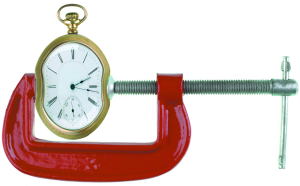 According to Science Nordic‘s James W Vaupel, head of the new Danish Max Planck research center, the 40-hour workweek is outdated. Professor Vaupel believes a 25-hour workweek is sufficient. The notion of a 25-hour workweek, although eerily tempting to most small business owners, sends shock waves through the small business community. Is a 25-hour workweek just wishful thinking on behalf of a professor who is likely tenured and possibly never run a small business or is it a brave, new, creative reality?
According to Science Nordic‘s James W Vaupel, head of the new Danish Max Planck research center, the 40-hour workweek is outdated. Professor Vaupel believes a 25-hour workweek is sufficient. The notion of a 25-hour workweek, although eerily tempting to most small business owners, sends shock waves through the small business community. Is a 25-hour workweek just wishful thinking on behalf of a professor who is likely tenured and possibly never run a small business or is it a brave, new, creative reality?
Since 1850, the patterns of work in the US have trended up – moving from 70-hour workweeks in the mid 1800’s to 60-hour workweeks in 1900 to 40-hour workweeks by midcentury. Since then, the hours worked have increased substantially – and 63% of all people are not happy about it! According to Families and Work Institute, most people would like to see their workweek reduced by ten hours, if possible.
For the small business owner and entrepreneur, the 40-hour workweek is rare. Although you may be open for business 40 hours each week, it’s likely that you’re using the hours before and after work – and on weekends – to tackle the multitude of things that need to be addressed in order to provide service when you’re open for business.
70-Hour Workweeks Spell F-O-O-L
Mounting evidence points to the accumulative impact of the extended workweek during which a small business owner is ever-on and always-connected. Conditions like exhaustion and burnout have a damaging impact on efficiency, creativity, effectiveness, productivity, and performance – the very traits that drive innovation and revenue for your small business.
Judge Ziglar, the brother of renowned motivational speaker, Zig Ziglar, put it quite aptly when he said, “Work 50 hours a week and you’ll be in the top 5% of your industry. Work 60 hours a week and you’ll be in the top 1% of your industry, and if you work 70 hours a week, you’re an F-O-O-L.” Of course, that was during a 1980 presentation long before technology made business faster.
Rethink Your Workweek
Small business has certainly benefited from advancements in technology. We’re smarter, faster, more cost-efficient to run, and certainly more competitive with the leveling of the David vs. Goliath playing field. Could Professor Vaupel’s assertion be correct? Are we mentally stuck in outdated ways of operating? Is it time to re-engineer our approach to work?
Meanwhile, back in Denmark, Professor Vaupel’s based his premise for a 25-hour workweek on extended life expectancy. Living longer also means the opportunity for working longer. The shortened workweek, Vaupel asserts, can extend over a longer period of one’s life, which is both psychologically and physically beneficial.
Younger entrepreneurs can spend more time with their young families while the “more mature” entrepreneur can take better care of their health and both can enjoy a better quality of life.
Whatever you think of Professor Vaupel’s theory, is it time we rethink our workweek? Is it possible to run a successful small business on a 25-hour workweek? We’re curious to know what you think.
Want more? Read on:
Five Ways Entrepreneurs Restore Work-Life Balance
Confessions From a Strategic Coach on Work/Life Balance

